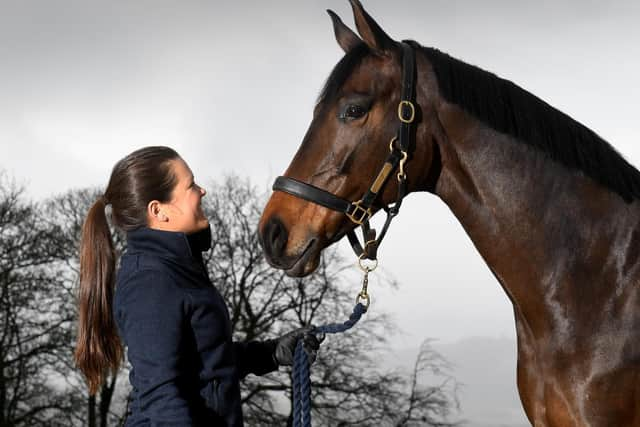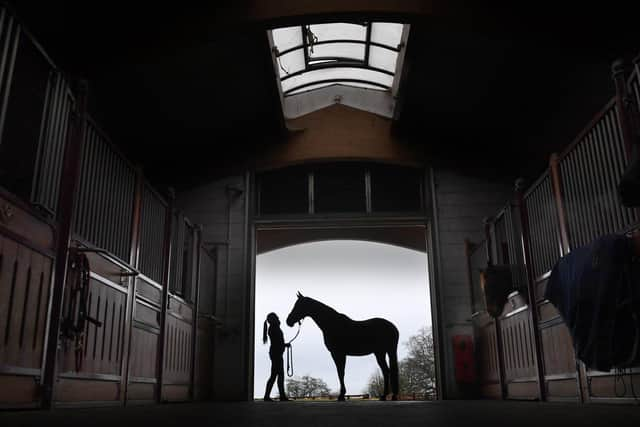I want to get my horse from Yorkshire to Spain but the post-Brexit paperwork is insane, says Mount St John managing director
An embryo transfer from one of its elite sport mares goes for some £20,000 and one of its star horses, Freestyle, may be going to the Olympics with Charlotte Dujardin, the most successful British dressage rider in the history of the sport.
But in recent weeks, faced with the new challenges of post-Brexit red tape, its managing director Emma Blundell has been trying and failing to get a pregnant mare out of the country to Spain where an eager buyer awaits.


Advertisement
Hide AdAdvertisement
Hide AdBefore the UK formally severed its ties with the European Union on December 31, a similar sale to mainland Europe would require a few forms lodged with the Department for Environment, Food and Rural Affairs and a vet's check to ensure the horse is healthy 48 hours in advance.
Now, due to what she describes as the "insane" paperwork required to export live animals from a 'third country', she has been unable to send the horse to Spain despite enquiring with transport firms every week.
Such were the delays - not helped by a travel ban caused by the pandemic - that Miss Blundell had to arrange for a different mare also 'in foal' to be exported instead.
She told The Yorkshire Post: "The trucks aren't even now allowed to be in the EU unless they've been recertified outside of the UK as allowed to drive abroad.


Advertisement
Hide AdAdvertisement
Hide Ad"I've been told that they have to go abroad and have a new registration made that allows them to be driving on roads in the EU. The drivers have got to pass new tests.
"They've obviously got to have their COVID tests as well now to get through the borders on each different country that they go through. There's new regulations for the drivers, for the trucks, for the businesses, we've got to have an export number that we've registered as a business, the place that receives the horse has to have done that.
"There's a huge amount of new paperwork and even having done all of that, for some reason, it seems that we still can't get a horse into Spain, with a commercial transporter.
"And they can't even give me a date of when they will be able to. It's not like they say they can do it in two weeks or in March or whatever. So at the moment, I risk another horse getting too far through the pregnancy to be allowed to travel again.”
Advertisement
Hide AdAdvertisement
Hide AdThough operating in a specialist field, Mount St John is far from alone in struggling with the new demands of exporting goods and services into the European Union post-Brexit.
Thomas Kerfoot is the founder and operations director of O&3, a cosmetics firm based in Ripon. which he runs alongside his two sisters, Jennifer and Eleanor.
The family-run business turns over £16m and employs 56 people, with an export market stretching across 47 countries.
When the trade deal was finalised at the 11th hour on Christmas Eve he and his sisters toasted in celebration, having been terrified of a ‘no deal’ outcome.
Advertisement
Hide AdAdvertisement
Hide AdHowever the reality facing his family’s business under the new trade deal is, in Mr Kerfoot’s view, worse than any outcome a No Deal scenario would have entailed.
“We just didn’t read the small print and we are faced with a very different situation,” he told The Yorkshire Post. “I genuinely feel for the country.”
Last year the business took the reluctant decision to move operations to Poland, from where it will conduct the circa £7m-worth of business it does with EU member states.
The Department for International Trade (DiT) has been encouraging UK firms to to set up EU facilities to avoid some of the logistical and regulatory burdens they are faced with.
Advertisement
Hide AdAdvertisement
Hide AdMr Kerfoot said: “I don’t think the majority of people out there can hand on heart say that this is what they voted for.
“The DiT is telling people and businesses in the UK to open an EU facility and that this is your way around this problem.
“That makes no sense as to why we did Brexit in the first place when we cannot supply our closest neighbours efficiently.
“People who talk about the positives of Brexit have not been on the front lines in terms of managing employees and customers and delivering difficult news. They are talking based on a principle rather than a practicality and we are feeling the consequences of those decisions.
Advertisement
Hide AdAdvertisement
Hide Ad“It makes no sense having a better trading relationship with New Zealand on the other side of the world when we can’t even deliver to France.
“I am incredibly gutted with what is happening.
“We can already see, one month into our new relationship, that significant amounts of business are not even going to touch the UK where we are not going to be taxed on it, we are not going to be employing people for it.
Since the new trading regulations kicked into effect in January, O&3 has seen its ability to ship goods from the UK to Europe grind to a halt.
It recently took the firm two weeks to source a truck to ship goods to Poland, a process which usually takes less than an hour.
Advertisement
Hide AdAdvertisement
Hide AdMr Kerfoot said: “[Going forward] we will not ship a single kilo of product from the UK to Europe.
“It is not worth the hassle and the cost. If you have an invoice that you are shipping from the UK to the EU they are not interested, they will literally cancel the order because they know what they are going to be faced with and the costs involved in doing so.
“The flow of goods between the UK and Europe is proving impossible logistically.”
One of the primary frustrations being felt across the region’s business community is the sudden arrival of new rules and restrictions which, until the end of last year, simply did not exist.
Advertisement
Hide AdAdvertisement
Hide AdFor years, commercial plant nursery firm, Johnsons Of Whixley, in North Yorkshire, sold as much as £500,000 of plants per annum to customers in Northern Ireland.
However as of January 1, the firm, based at Kirk Hammerton near York, can longer do so because soils from the mainland of the United Kingdom cannot be allowed into the island of Ireland, either in the Republic or Northern Ireland, even though the latter remains very much part of the country.
The new legislation stops nurseries like Johnsons supplying Rootball, Bare Root and Container plants into the EU and, under the terms of the trade deal thrashed out by the UK and the EU, these rules now apply to Northern Ireland as well.
Plants which originate from a bare root young plant, or those that have had any contact with the soil, even if container grown, are considered by the terms of the trade deal to be a risk due to the likely legacy of soil residue which has the potential to carry pathogens or nematodes.
Advertisement
Hide AdAdvertisement
Hide AdWhile it is technically not impossible to remove soil residue, the process is hugely impractical and as such long-standing customers of Johnsons and many other nurseries are left with no choice but to go directly to EU suppliers as there are no restrictions on a legacy soil residue between EU members or affiliates in the guise of Northern Ireland.
The firm’s head of production and procurement, Jonathan Whittemore, said: “This legislation penalises UK growers and gives an immediate competitive advantage to EU suppliers who may go on to monopolise supply into an existing part of the UK at the expense of our business and the wider industry.
"The Brexit ‘project’ was meant to reduce red tape and bureaucracy and was surely not intended to penalise UK Suppliers and active Northern Ireland/UK customers. The restriction was designed to protect the wider EU Flora and Fauna, under this scenario there is ‘nil’ risk to the EU from Johnsons traditional supply into Northern Ireland be it from our own production or ironically imports sourced in the EU and supplied into Northern Ireland.”